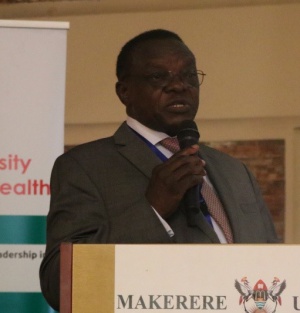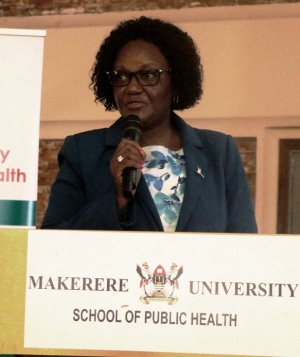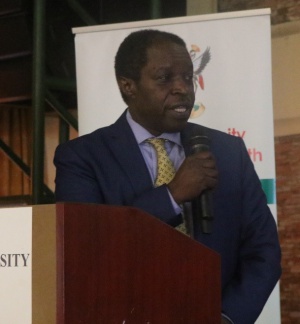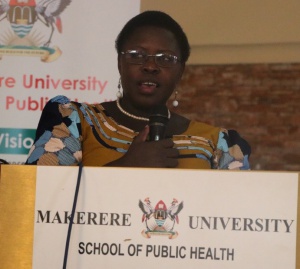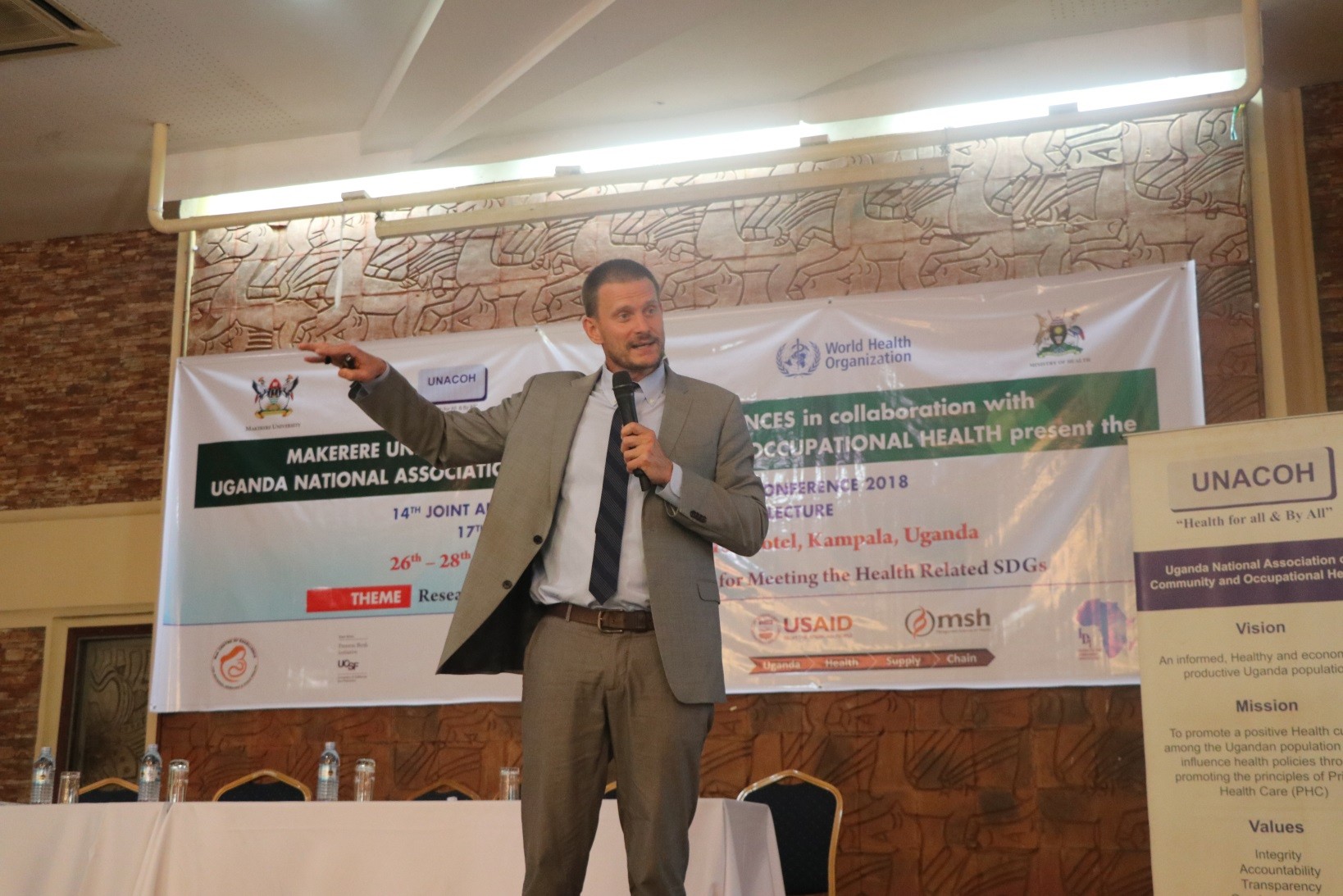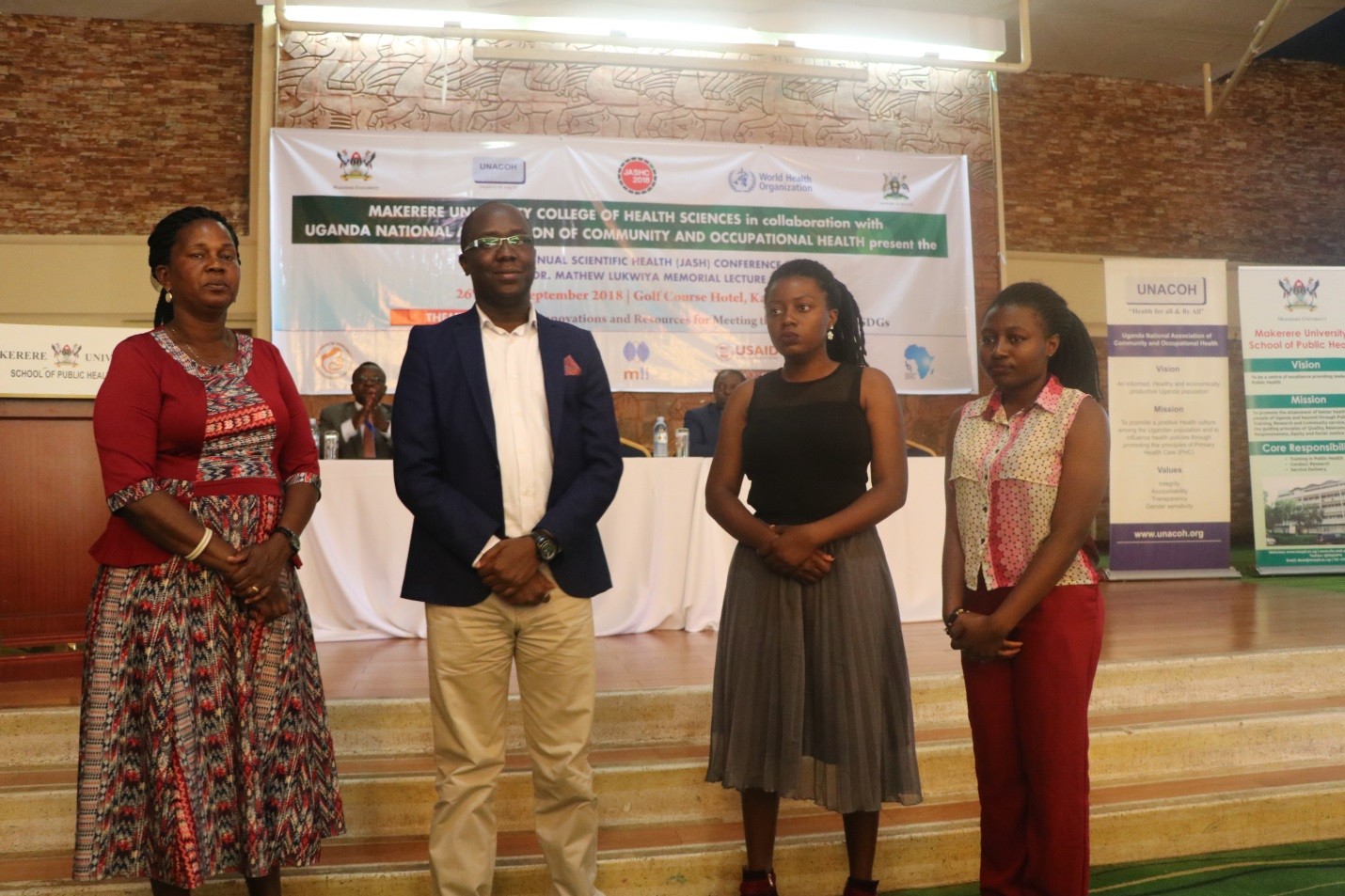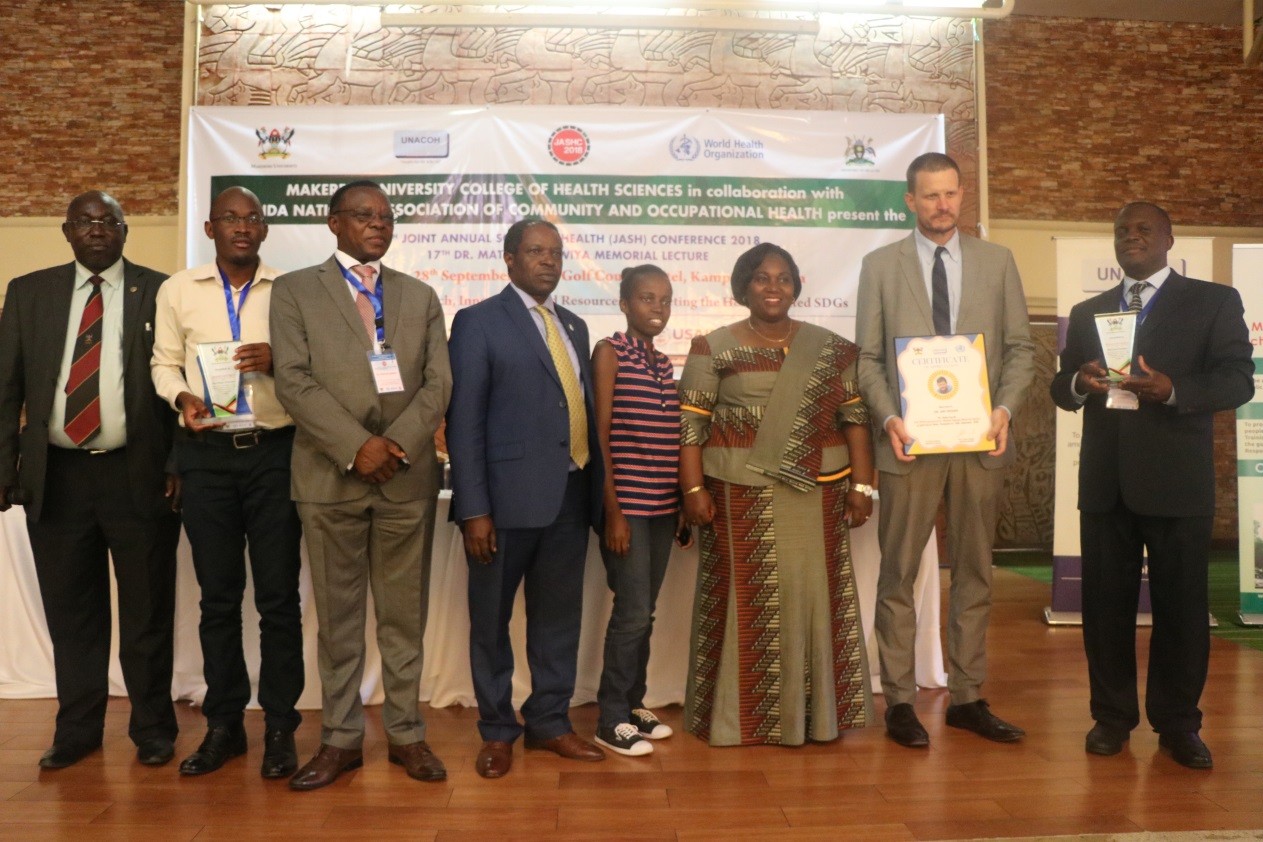On Friday 28th September 2018, the academic and scientific community remembered the legacy of Dr Matthew Lukwiya in the fight against Ebola, at the Golf Course Hotel, in Kampala, in a memorial lecture held in his honour. The event came at the end of the Joint annual Scientific Health (JASH) Conference.
Dr Patrick Kadama (picture above) expressed UNACOH’s pride in being associated with the annual event of the memorial, which reflects on how the fight against Ebola has been waged, and the progress made against this global danger. He welcomed everyone present, further urging them to “come in perpetuity”. He also appreciated World Health Organization (WHO) for their continuous support towards this memorial lecture.
The Dean of MakSPH voiced the pleasure of the School for not only the relevance of the closing ceremony, but also for the “very brilliant highlight” after the research dissemination opportunity. “This is always a key highlight for us at this conference because we recognize Dr Matthew Lukwiya and all the others who have passed on in the line of duty”, she said.
She also expressed her excitement at her having the representative of the Ministry of Health (MoH) at the lecture, the hope being that the collaboration between MakSPH and MoH could be further strengthened, to improve action. “While the papers and publications improve the ranking of the university, and are a satisfaction for academia in themselves, that is not enough”, the Dean emphasized, adding that the ultimate aim is to see the use of the evidence generated by research to improve
Prof Wanyenze also appealed to the Minister “to create a regular forum where academia can identify areas where evidence is required, to address gaps for MoH”. “The grants we write all the time, will be better informed if we fully appreciated all the gaps and areas where you want us to direct our research and focus”, said Prof Wanyenze, “to feed within our University-wide research agenda”. She also asserted that it would be imperative to have a platform to share selected critical research data and findings which affect greatly, policy and practice.
The Deputy Vice-Chancellor and former Dean of MakSPH, Prof William Bazeyo, in his address contended that conferences organized by MakSPH were bound to be more successful than when organized by other schools. He also asserted that sometimes research done by the professionals is ignored by policymakers because either they do not have access to it, or the methods of dissemination, or when they come, they are not given enough time to attend disseminations. “I would like to request the minister that the forum which Prof Wanyenze asked for is very important so that you give us an opportunity so that we share with you what we find, at your own convenience. He likewise re-iterated that MakSPH carries out almost 65% of all research at Makerere University, albeit 99% funding for the research is by Development Partners.
The Deputy Vice-Chancellor also challenged MakSPH to establish a think tank. “When a strange disease breaks out in most of the developed countries, universities discuss it on BBC, CNN, Al Jazeera and others, through existing mechanisms of think tanks”, he said, additionally calling upon the medical fraternity especially the College of Health Sciences and specifically MakSPH, to emulate the practice. Admitting that establishing a think tank was expensive, he revealed that the university had budgeted for at least two think tanks in its budget, and urged MakSPH to take advantage, grasp the opportunity, and start immediately, warning that any hesitation would give leeway to other Schools who were trying to do the same.
of MakSPH, Prof William Bazeyo
Prof William Bazeyo challenged the audience to think of what they would wish to be remembered for, adding that so many people had died of Ebola, but were not being honoured. “Why Dr Matthew Lukwiya? We need to be a contribution where we are, otherwise you will never be remembered”, he stressed.
The chief guest, Hon Dr Joyce Moriku Kaducu (pictured above), the State Minister in charge of Primary Health Care and also Woman Member of Parliament for Moyo District, expressed her excitement at being able to attend the memorial lecture, adding that she had a strong academic background, and therefore felt at home in such surroundings.
She appreciated the researchers present for “spending sleepless nights” in trying to come up with innovative solutions to the different and varied health issues that concern Uganda. “For us to be able to be productive and transform our country, we must be healthy”, she said.
“The Minister also highlighted the importance of honouring the legacy of Dr Matthew Lukwiya, asserting that such an event “also commemorates our gallant son who lost his life in the fight against Ebola”. She further said that “It is important that we continue the legacy of such great men and women”, Hon Kaducu said, and “to reflect on whether we are making positive progress in our desired area of development most especially the health sector.
She commended the participants in the country for their doggedness in pursuing improvements and innovations in health. “Every minister and ministry needs a committed group of people like you who are committed to being part of, and seeing the success of the activities of the ministry”, said Dr Moriku Kaducu. She pledged to consider the idea of for a for scientific research forum in a different setting for further discussions.
The guest speaker, Dr Ian Crozier, revealed that he was coming from the Democratic Republic of Congo (DRC), where he had received “Patients 152, 153 and 154 just 48 hours earlier on September 26th in the raging outbreak in the DRC. He expressed pleasure to be not only at the lecture but anywhere anyway, given that his life had almost ended exactly four years prior to the lecture, the timing is rather awkward given that the same date is ironically also his birthdate. Stressing that he was not a global health expert or a policymaker in any right, he revealed that his was an experience of a bed-side clinician and survivor of Ebola. Dr Crozier also revealed that he had developed some quite awkward behaviour like meandering around which he initially attributed to the after-effects of Ebola, but had since recognized as otherwise.
In a rather moving manner, Dr Ian Crozier recounted his experience with Ebola; it began when he voluntarily joined a WHO team providing technical expertise to a group of medical health care workers who were really struggling to deal with an exploding outbreak. He had been working in Panama. “So many nurses and doctors died during the outbreak; the numbers of patients were overwhelming, sometimes 6, other times 8 patients dying each day; it was a very constrained environment even in terms of resources”, disclosed Dr Crozier, an eerie feeling creeping over the audience due to the images he displayed while narrating the story behind. “Some people survived”, he disclosed, adding that “the goal of clinical care given is to have survivors”. It was his deep involvement and bed-side response that exposed him to the disease. He also disclosed that he still struggles to find his words.
Dr Crozier said that despite the gloom of the situation, he saw glimmers of hope that he “found quite remarkable”; when parents who had lost their children to the disease started offering care to those children who had lost parents. He was awarded
The family thanked the World Health Organization (WHO) for the effort put into the last 17 years to recognize the sacrifice of the Doctor and other health workers who had perished. She also thanked UNACOH for organizing the conference and memorial lecture.
The event was crowned with an award – giving ceremony by the Deputy Vice – Chancellor. Dr Ian Crozier received an honorary award; Jimmy Osuret received the Best Poster award; Ronald Mulebeke received the Best Oral Presenter award, while the Best Innovator was Violet Nabimanya (Using Mobile - Health Platforms to foster completion of the elimination-of-Mother-to-Child-Transmission, eMTCT, of HIV cascade)
A certificate was given to the Dean Makerere University College of Health Sciences, School of Biomedical Sciences as the hosts of the next JASH Conference in 2019.
The events came to an end in the late afternoon of Friday 28th September 2018. It was recorded as an overwhelming success.
Secretariat:
- Prof Fredrick Makumbi – Chairman, Organizing Committee
- Prof Noah Kiwanuka – Chair, Scientific Committee
- Dr Elizabeth Ekirapa Kiracho – Co-Chair, Scientific Committee
- Dr Peter Waiswa – Chair, Finance Committee
- Dr Simon Peter Kibira – Co-chair, Finance Committee
- Mr John Mukisa – Co-chair, Finance Committee
- Dr David Musoke – Chair, Publicity Committee
- Prof Nazarius Mbona Tumwesigye – Co-chair, Publicity Committee


